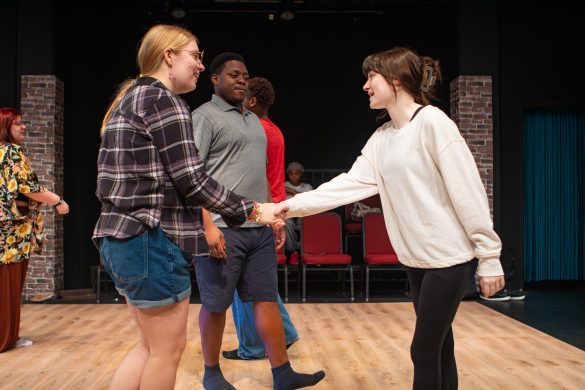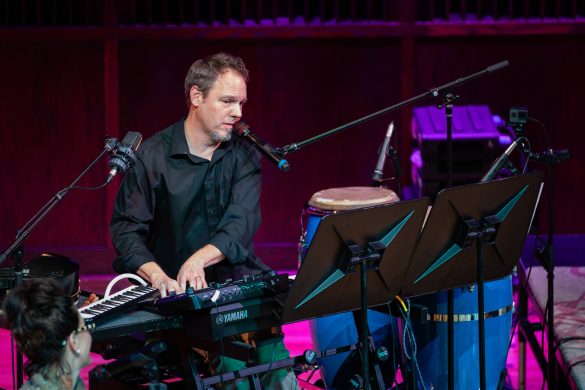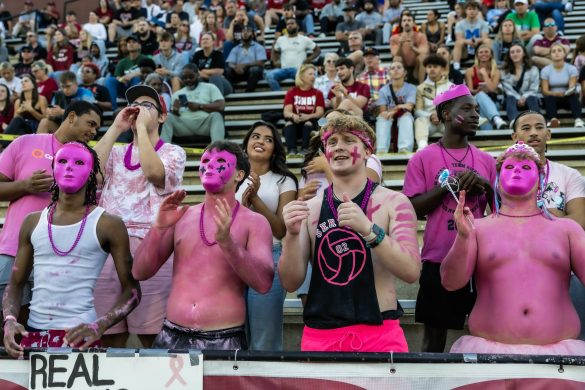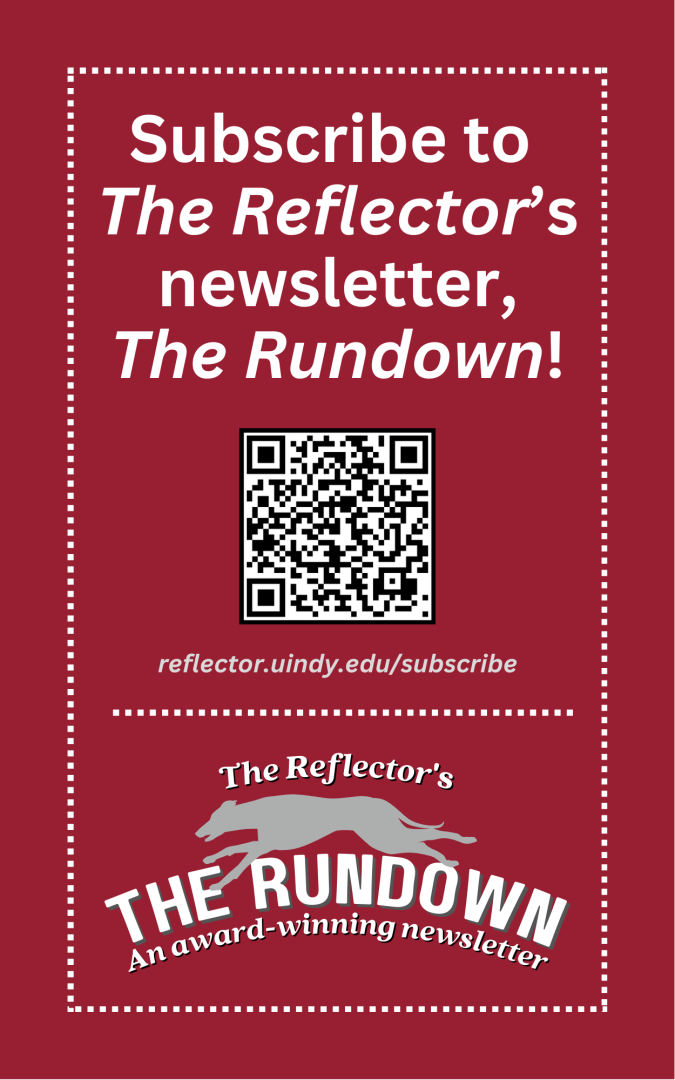Music is a performing art, but it is difficult to perform one’s art when there are social distancing and mask guidelines to follow. As a result, music recitals at the University of Indianapolis this year will be live streamed from the stage at Ruth Lilly Performance Hall, or students can film their recital at home and submit it online, according to junior music major and vocalist Samantha Beckham. This was a new decision that has to be made for the many students in the Department of Music, who have to perform recitals as part of their majors’ requirements, according to Beckham.

Beckham decided to record her recital from home. Most students performing a recital this year decided to do the recordings rather than perform on stage because it is easier, according to Beckham.
“The whole point of recitals is for friends and family to come view you and watch you perform, it’s a very big event,” Beckham said. “A recital is basically showcasing all you’ve been doing for the past three years at UIndy, learning all your music, how you’ve improved vocally or instrumentally depending on what you play or sing. So I think a lot of people have decided to do virtual because they know that their family isn’t able to come, because anybody off-campus isn’t allowed on-campus.”
The struggle of doing a recording comes from not being able to work with an accompanist, Beckham said. Usually, a vocalist would have an accompanist to work and connect with to make the performance good, according to Beckham.
“Having it done virtually, it really strains my soul because I don’t have that other ensemble piece or the accompanist live with me to help me out or make the music necessarily,” Beckham said. “All of our accompaniment we had to do a phone recording and then we play the phone recording in our video, so it’s just a recording that we sing along to, kind of like karaoke a little bit. We can do it and it’s fine and it sounds pretty good, but especially depending on the music, there’s not a lot of room for interpretation. It’s very cut forward, like I have to sing it this way so it makes sense with my recording and my accompanist.”
The biggest impact COVID-19 has had on Beckham’s experience as a singer has been the distance from other performers, she said. Singing in groups, like a choir, is no longer the same, according to Beckham.
Beckham is not alone in navigating these changes to her life as a musician and performer. Junior music therapy major and flute player Emily Justice has a passion for music that comes from its ability to help others, she said.
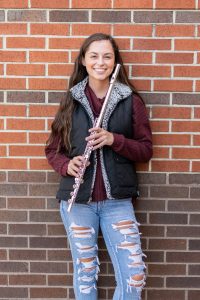
“My focus that I want to eventually work with is elderly adults, particularly Alzheimer’s [patients],” Justice said. “I’ve seen the effects that music can have on that population, so I’m very passionate about looking at people through that.”
The music therapy major requires only one recital in either junior or senior year, but Justice opted to do two, one this year and one next year, she said. She decided to go through with having her recital on stage on Nov. 1.
Instrument players have masks designed for them to play with, Justice said. The masks that were ordered for UIndy’s instrument players were more suited to instruments that go directly into the mouth rather than to the side, so Justice had to create her own mask, she said.
“I actually had to make my own mask, and it’s basically like a shower curtain over your face, so it goes way down to cover your flute as you put it under the mask and the flute itself also has a shield on it to also protect people around you when you’re playing,” Justice said. “That, for sure, is the biggest thing that has been a challenge.”
The COVID-19 pandemic has also changed Justice’s experience in her practical experience for music therapy, Justice said. A lot of music therapy majors have had to start using teletherapy with their clients, according to Justice.
“I am lucky that I’ve gotten to be in-person in a client’s home,” Justice said. “The company I’m working with has started to go back into the community. I know that a lot of my peers are dealing with the teletherapy aspect of it and it’s really hard to connect with your clients over a screen, especially kids. I can’t imagine doing it with my clients, who are four and eight and eleven. It’s just really hard to get their attention, connect with them, so as a music therapy major that’s probably been the biggest thing.”
Junior music education major and vocalist Meagan Brown is another performer facing changes to the practice of her major. Her decision to teach music stems from the joy she gets from singing, according to Brown.

“It was just something I always liked to do and every time I did it it just brought me so much joy,” Brown said. “Whether it was on stage or in the car it just brought me so much joy. I’ve been teaching since I was seventeen and I started doing voice lessons for the younger kids that were in the choir, like freshman and sophomores. Someone was like ‘You’re a really good teacher’ and I was like ‘Hey, thanks!’ I was really passionate about teaching and singing and I was like ‘You know what, music education. That’s it, that’s the combination of both the things I’m passionate about.”
Brown chose to turn her recital in virtually. While she is disappointed about not being able to perform in the performance hall, she is fine knowing that she has gotten to perform there many times before, Brown said. Having to perform the recital at home is the hard part, according to Brown.
“I live at home with my parents and my little sister, so it’s going to be hard to find a space where it’s just me, because on the stage I would have had all this room to gesture and truly perform, but being at home if I move my hand I might hit a lamp or something,” Brown said. “So, that’s hard. It’s just gonna be hard to find a place where I can just let go and not worry about the things around me or any noises I might hear and just perform.”
Brown, like Justice, is figuring out how to do her practical experience of teaching during this pandemic. Due to COVID-19 exposures at the school she teaches at, she has had to quarantine and teach over Zoom, she said.
“I wasn’t able to teach in person and piano is not really doable over Zoom because neither of you can see each other’s hands or the keys or anything, so I was just teaching voice over Zoom. I’m not very techy so I had like my phone where I could see my student and then I had my iPad with my notes, and then I was at my piano. That was really hard because I didn’t really have a plan technologically,” Brown said. “I was like ‘Okay I know how Zoom works, I can do that,’ but with students being in their house and all their siblings running around and their dogs and their families, it’s just really hard to learn and to quality teach over Zoom when you can’t control the environment and not be in a classroom with just you and a student.”
Being a music major during this pandemic is a struggle, according to Beckham. However, it is fulfilling to be singing in some capacity despite the distance from others and the masks, Beckham said.
Brown matched her sentiments. Everyone thought that by this semester things would be different, but they are a lot better, Brown said. Professors worked really hard to provide masks, recording equipment and any other resources needed by the students, according to Brown. She is really appreciative of the resources that students were provided with, Brown said.
“None of them are ideal but we all worked really hard trying to figure out some sort of solution,” Brown said. “It’s not great but I’m just grateful to be able to sing at all.”

